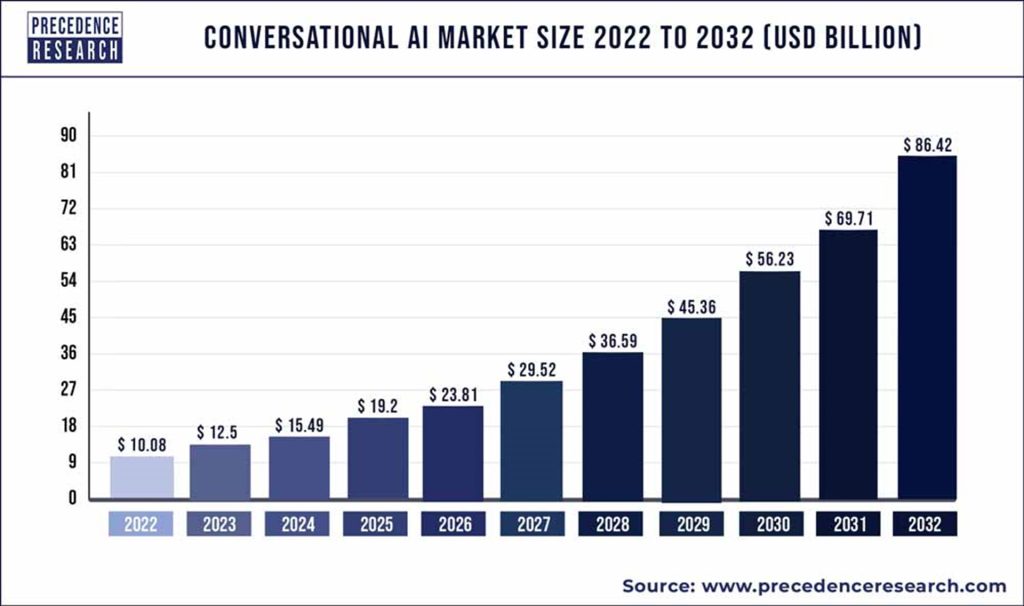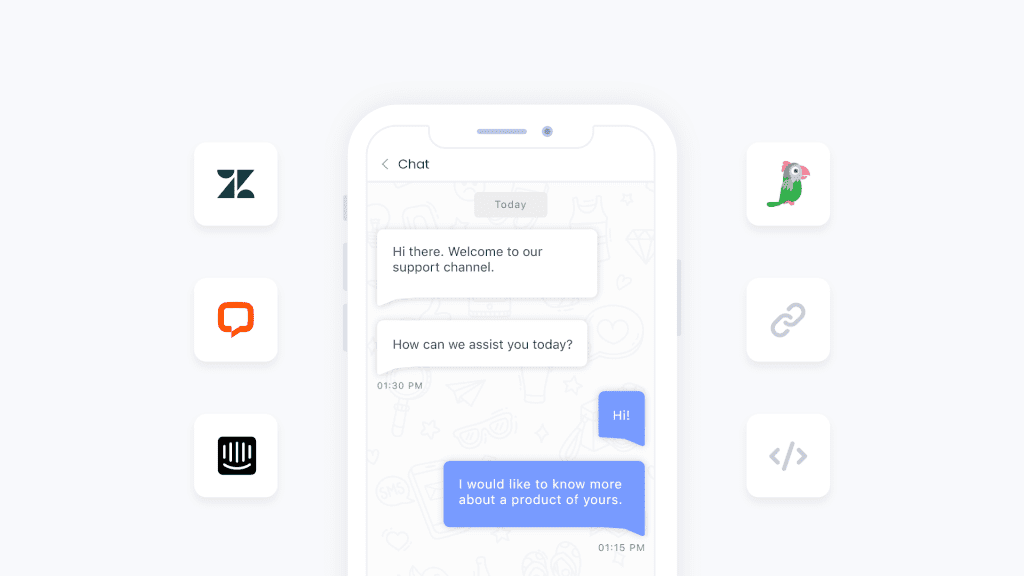Mobile apps have emerged as the ultimate medium for communication and business. If you are here, you are already aware of the significance of developing an app. It is only wise to build an app of your own and use it to amplify your reach and engagement. However, the rapidly evolving landscape of apps is also increasing the competition.
App users have a plethora of options to choose from and thousands of new apps are published every day. As a result, achieving user engagement and retention goals is becoming more challenging. Chatbots can prove to be a boon in the due process and power your efforts of retaining customers. Moreover, the advent of AI chatbots takes this a step further.
AI-powered chatbots can amp up your customer support system and contribute to the overall growth of your business. This blog post will help you understand the same. Read along and learn how you can use AI-powered chatbots to boost your engagement and amplify your app growth metrics. Also, find out the easiest way to build a chat-enabled app and go fully mobile.
In this blog
- AI-powered chatbots: An introduction
- The importance of AI chatbots for mobile apps
- How to use AI-powered chatbots in your app?
- How to create a chat-enabled app?
AI-powered chatbots: An introduction

We have been interacting with chatbots for quite some time now. From website help desk popups to support channels and lead generation forms on eCommerce and banking apps, chatbots are everywhere. They are being integrated with websites, apps, and social media platforms to enable multi-channel support for consumers.
Earlier, chatbots were just reproducing parts of the huge corpus of text fed into their system. They were based on logic and rules and were often limited in terms of potential and dynamism. However, the introduction of AI has taken the experience further. Generative AI platforms like ChatGPT, Bard AI, etc., have revolutionized chat systems for the better.
Such AI-powered chatbots can be defined as software applications that utilize and incorporate a range of AI technologies to produce answers to queries input by users. The key components and technologies may include machine learning (ML), natural language processing (NLP), deep learning, and so on. AI-powered chatbots use all such technologies to make conversations more functional and sophisticated.
As a result, chatbots are now more advanced and intelligent. They are equipped with diverse capabilities like better interpretation of human inputs, user behavior and sentiment analysis, integration with other technologies, and so on. In essence, chatbots have developed to become highly aware conversational agents.
Suggested Read: Conversational Marketing: The complete guide for online businesses
The importance of AI chatbots for mobile apps
Chatbots are making conversations easier and more productive across business platforms and marketing channels. Their significance increases on mobile apps as smartphones have become our go-to solution for every need. People pick up their phones for shopping, ordering food, connecting with their favorite brands, scrolling social media platforms, finding a date, and so on. Naturally, it is wise to offer them instant support on the platform where they are present the most.
Here are some more advantages of integrating AI-powered chatbots in your mobile app:
Advanced resolution and assistance
The first and foremost benefit of AI-powered chatbots is that they ensure more sophisticated assistance. AI-powered chat systems are mostly cost-efficient, affordable, and often easy to set up. This reduces the barriers to entry and enables almost any app owner to incorporate the feature into their app. Moreover, it reduces the response time, enhances the resolution rate, and eliminates the chances of errors that are a common characteristic of human-powered chat systems.
Smart prediction and sentiment analysis
If you have been wowed by the accuracy of the predictive text feature in your digital keyboards, you are already aware of the power of predictive technology. AI chatbots take this experience several notches up and analyze the sentiment and behavior patterns of users. This allows them to personalize the experience and generate more accurate responses. They can also predict user frustrations and frictions and offer resolution even before users ask for help.
Reduced agent dependency and fatigue
AI-powered chatbots can take the load off human chat agents. In fact, they can also completely replace the agents in many industries and verticals. This makes the job easier for small-scale businesses that are not funded enough to hire and train a huge team of support professionals. Moreover, AI chatbots and human agents can also be made to work together to achieve better results without suffering any fatigue, limitations, and errors.
Better lead generation and conversion
The benefits listed above clearly establish that AI chatbots enhance user experience and satisfaction. Faster response timings, optimized resolutions, and personalized responses lead to a satisfied customer base that is easier to engage and retain. Everything from acquisition to retention gets streamlined. All these factors boil down to the fact that you get better business. It leads to increased lead capturing and conversions and pushes your metrics toward immense growth.
Read in detail: The unlimited benefits of integrating chat feature in your mobile app
How to use AI powered chatbots in your app?
Now let us cut to the chase and understand how you can use AI powered chatbots in your app. Go through the suggestions listed below:
Start with analyzing your goals
Start with understanding how you want to use the AI powered chatbot in your app. The answer will depend on understanding the goal and purpose of your app. Additionally, a clear understanding of the competitors and target audience and a grasp of the contemporary market can help you head in the right direction.
For instance, you can use your AI chatbot for:
- Onboarding and navigational guidance
- Shopping and purchasing assistance
- Content and search assistance
- Language translation
- Lead generation
- Customer support
- Troubleshooting support
These are only a few among many examples. Depending upon your goal, you can train your chatbot to offer all kinds of support and assistance to your app users. You can also use chatbots to help your app development team in managing the backend of your app.
Find the right platform and tech stack
Once you have identified a goal, it will become easier for you to find the right platform. There are several AI-powered chatbot platforms that can help you achieve your goals. Several businesses have started experimenting with popular generative AI platforms like ChatGPT, Microsoft Bing, and so on. Additionally, you can also use platforms like Jasper, Tidio, Zapier, Kommunicate, etc. Find the one that aligns with your budget and goals and move ahead accordingly. If you want to create an app from scratch and integrate a chat feature in it, you can try out AppMySite’s no-code app creator.
Configure and train your AI chatbot
Once you have enrolled for the right AI chatbot platform, you can start with training it. Use relevant data and content to train your AI model. Design the conversational flows, user journeys, and interactions, etc. Use natural language processing (NLP) to make the process more intuitive. You can also get expert help at this stage. Based on your goals and targets, you can also train your chatbot by feeding possible queries and their corresponding answers. If you are using AI, do not attempt to push it as a human agent. Instead, give it a catchy name and let people know that they are being assisted by a highly trained AI assistant.
Test and get feedback from users
Once you have trained your AI model, you can start testing it. Involve your stakeholders, colleagues, and even real users if possible. Prepare different test cases and scenarios and start analyzing your AI assistant. Make sure that it performs satisfactorily across all scenarios and generates accurate results. Remember, this step is highly critical. Also, testing is a consistent process, and you should test your chatbots whenever you introduce any new content or data. Make sure it synchronizes well with the app and blends with the app’s real estate and content.
Collect and analyze data and insights
Once you have tested your AI chatbot, you can roll it out for your app users. Make sure that you have a data collection and processing system in place. Start collecting and analyzing the data from all interactions and use it to make improvements. You can also ask users to give ratings and feedback. Use the chats to understand the gaps and loopholes and overcome them with the right strategy and efforts. Make data-backed decisions for your chatbot and enhance the overall performance of the app.
Suggested Read: Top live chat and customer support software for your mobile app
How to create a chat-enabled app?

The process of mobile app development is highly intricate and complex. The exact procedure of integrating an AI chat software or creating a chat-enabled app depends on your development approach. You can read our holistic guide on how to create an app and learn the step-by-step process of building an app. This will help you get started on the right path.
Moreover, the easiest way to develop a chat-enabled app is to build it with AppMySite. Here, you can design and create your app without coding and integrate features like ‘chat’ and ‘push notifications’ with simple point-and-click options. If you already have a website, you can turn it into an app and sync your website’s chat software to the app. For instance, WordPress website owners can turn their site into a WordPress app, and so on.
This is just one example. AppMySite enables all kinds of app development. Whether you have a website or not, you can design and develop your app with the no-code app creator and publish it in the Google Play and Apple App Store. Enrich your app with the chat feature and allow your users to access instant support and resolution. Explore the platform and learn more.
